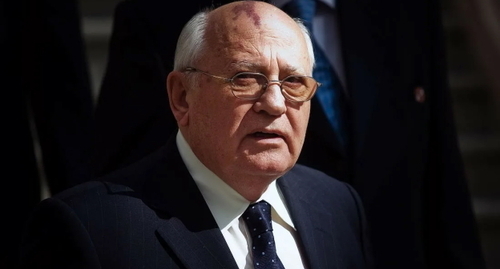Mikhail Gorbachev leaves controversial trace in Caucasian history
Mikhail Gorbachev, the first USSR president, launched the era of perestroika and glasnost; however, during his stay in power, tragic events occurred in Tbilisi, Baku and Yerevan, and the conflict over Nagorno-Karabakh flared up.
Mikhail Sergeyevich Gorbachev, the first and only president of the USSR and the last General Secretary of the Central Committee of the Communist Party of the Soviet Union (CPSU), died on August 30 in a Moscow hospital after a long illness at the age of 92, the RIA "Novosti" has reported.
In the history of the Caucasus, Mikhail Gorbachev remained as a leader whose innovations subsequently sparked criticism, and in some cases led to tragic events. The growth of tensions in a number of regions and republics of the USSR in late 1980s-early 1990s, in particular, ultimately led to the collapse of the Soviet Union. Not the last role in this was played by Gorbachev's actions. However, the era of his reign was also marked by a number of positive aspects – the introduction of a policy of glasnost, the freedom of speech and press, and democratic elections.
On April 9, 1989, a peaceful oppositional rally near the Government House of the Georgian SSR was dispersed in Tbilisi. Units of the internal troops and the Soviet Army took part in the operation; due to the militaries' actions and the resulting jostle, according to various estimates, from 19 to 21 people perished; several hundred others were injured.
In 1990, tragic events occurred in Azerbaijan, which are fixed in the country's history as "Black January". At night on January 20, at the command of USSR's leadership, a 35,000-strong army corps was brought into Baku. As a result of the special operation, 137 civilians perished; and more than 744 others received wounds. The blame for the tragic events lies, in particular, with Gorbachev, the first president of Azerbaijan, Ayaz Mutalibov, is convinced.
During the Gorbachev's rule, the Karabakh conflict broke out. In February 1988, an extraordinary session of the Council of People's Deputies of the Nagorno-Karabakh Autonomous Oblast (NKAO) adopted an appeal to quit Azerbaijan and join Armenia. This step led to massive interethnic clashes, culminating in the expulsion of Armenians from most Azerbaijan cities and districts. On December 10, 1991, a referendum was held on the independence of Nagorno-Karabakh. Subsequently, this led to several armed conflicts between Azerbaijan and Nagorno-Karabakh.
In May 1990, street fights broke out in Yerevan between internal troops and "self-defence units". As a result, two soldiers and 14 self-defence fighters perished.
This article was originally published on the Russian page of 24/7 Internet agency ‘Caucasian Knot’ on August 31, 2022 at 03:24 am MSK. To access the full text of the article, click here.






![Tumso Abdurakhmanov. Screenshot from video posted by Abu-Saddam Shishani [LIVE] http://www.youtube.com/watch?v=mIR3s7AB0Uw Tumso Abdurakhmanov. Screenshot from video posted by Abu-Saddam Shishani [LIVE] http://www.youtube.com/watch?v=mIR3s7AB0Uw](/system/uploads/article_image/image/0001/18460/main_image_Tumso.jpg)